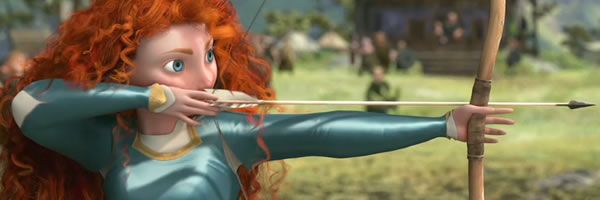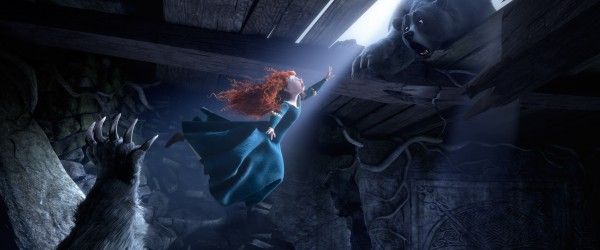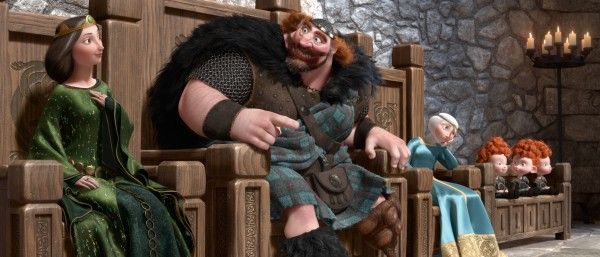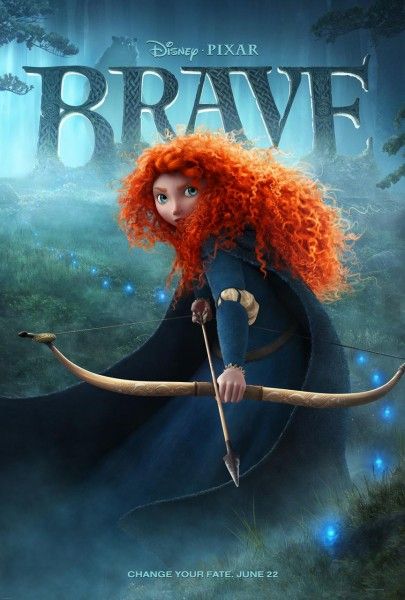Sometimes meeting in the middle isn't good enough. There's merit in compromise, but it can also foster mediocrity. In order to be brave and bold, you have to step out of a comfort zone and take a chance on something that may not appeal to the masses. From 2007 – 2009, Pixar excelled at this risk-taking in the field of animated family films. They proudly made a movie about a rat and artistic expression. They showed no qualms in spending an entire first act on a post-apocalyptic Earth. They embraced an elderly hero who used his walker as a weapon. Making a fairy tale with a female protagonist wasn't groundbreaking, but it was new ground for the revered animation studio. However, their new film Brave, retreats into the timidity of a standard princess narrative, limits the view of young girls to merely the issues they have with their mothers, and then teaches a weak lesson about communication. The movie is filled with lush visuals, a nice sense of humor, and a good heart, but there's not much bravery in Brave.
Young princess Merida (Kelly Macdonald) cherishes her tomboy freedom. Nothing makes her happier than picking up her bow, riding through the forest, and exploring the wilds. Her mother Elinor (Emma Thompson) would prefer her daughter to be a "lady", and behave in a manner that would make Emily Post proud. Both women feel ignored by the other, and their friction comes to a head when Elinor tells Merida that she will be betrothed to a son of a fellow clan in order to keep the peace. Sensing that her freedom is about to be taken away forever, Merida runs into the forest where she meets a bear-obsessed woodcarver/witch (Julie Walters). The princess makes a wish to "change her fate", and gets the witch to cast a spell which eventually turns Elinor into a bear. The two must flee the castle in order to avoid her hunt-happy father, Fergus (Billy Connolly), and find a way to reverse the spell before the queen becomes a bear not only in both, but in mind.
"Why a bear?" the princess asks when she sees her physically transformed mother when all Merida wanted was for the queen to change her mind about the engagement. Perhaps it's because bears symbolize the wild nature of Merida and that's the only way Elinor can relate to her daughter's disposition. It also gives the script its best comic moments as Elinor-the-Bear tries to act like the proper Elinor-the-Human. In all of its schizophrenic marketing, Disney tried to dance around the spell that would "change Merida's fate", but it's the crux of the whole story, and it's where Brave takes its biggest chance. It's not much of a chance, but Pixar deserves credit for finding a way to develop the emotional resonance between its two lead characters when one of them can't speak but still tries to communicate like a human being.
However, the central issue regarding their communication lacks depth. "Legends are lessons," pre-Bear Elinor tells Merida, but Brave teaches a lesson that has been taught countless times through countless hours of kids' programming (about 40% of all Nickelodeon shows are about parents and their kids sorting out their disagreements). Even Pixar explored this territory by having it as one of the supporting plots in Ratatouille. But Remy's reconciliation with his father isn't the point of that story nor is its driving narrative, and the film is better for it. Ratatouille wraps us up in the joy of creation and artistic passion. Brave tells us "Parents listen to your children, children listen to your parents," and then sends the audience on its way.
This simple lesson is undermined by the assumption that both Merida and Elinor's views have merit. However, Elinor's view is clearly wrong. Yes, Merida should understand that becoming an adult means having to make sacrifices and not doing what you want all the time, but no audience member will seriously consider the argument, "Yeah, why doesn't Merida learn to be responsible and marry some guy she's never met?" We're all in agreement that Elinor should appreciate her child's need for independence, and even the filmmakers err more on Merida's side by having Elinor physically transform into a creature that can be as wild as her daughter. But when it's time for Merida to step into her mother's shoes, the result is a wishy-washy solution that helps the princess understand the responsibilities of being a queen without forcing her to think through the ramifications of her solution.
If the plot and lessons sound curiously like Freaky Friday, you wouldn't be far off. There's nothing wrong with Freaky Friday. It's a delightful comedy where a magical spell resolves a mother-daughter conflict by forcing the protagonists to see the other's point of view. Pixar simply tweaks the premise and then dresses it up in majestic landscapes, a fun sense of humor, likable characters, a terrific score, and a physical world that feels far grander than the story that takes place within it. Brave attempts to create a small, intimate story at its center, but they've come away with a tale that feels simple and familiar.
Rating: C+




